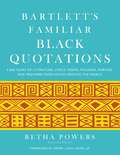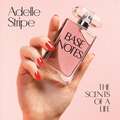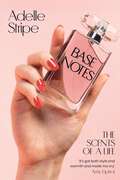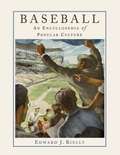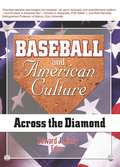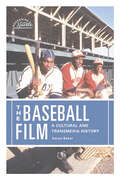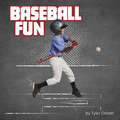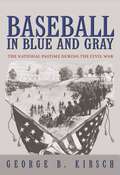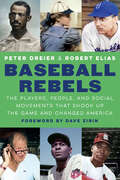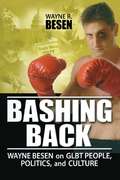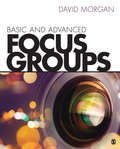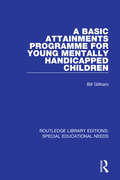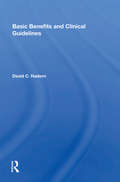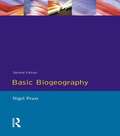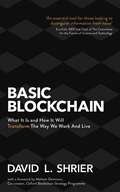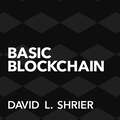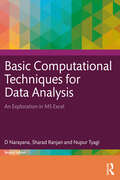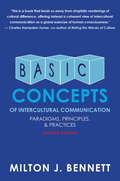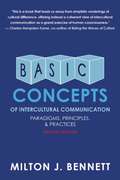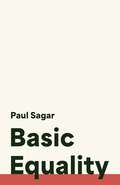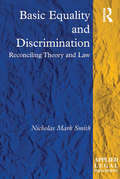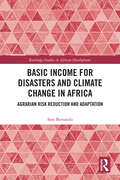- Table View
- List View
Bartlett's Familiar Black Quotations: 5,000 Years of Literature, Lyrics, Poems, Passages, Phrases, and Proverbs from Voices Around the World
by Henry Louis Gates Retha PowersA comprehensive, all-new collection bringing together the most thoughtful, inspiring, and wisest voices from the Black diaspora across history.BARTLETT'S FAMILIAR BLACK QUOTATIONS paints a rich canvas of Black history through time. Five thousand quotes are culled from the time of Ancient Egypt through American slavery, Jim Crow, the Civil Rights Era, Apartheid, to the present day. With a foreword by Henry Louis Gates, Jr. and passages from authors, artists, scientists, philosophers, theologians, activists, politicians, and many others, BARTLETT'S FAMILIAR BLACK QUOTATIONS will appeal not only to quote aficionados and researchers, but also to history buffs. Aesop's Fables and the Holy Bible are in the same company as Nelson Mandela and President Obama; Maya Angelou and Toni Morrison; Bob Marley and Jay-Z. A wonderful reference tool and gift, BARTLETT'S FAMILIAR BLACK QUOTATIONS is sure to follow in the footsteps of Bartlett's Familiar Quotations, becoming a beloved authority.
Base Notes: The Scents of a Life
by Adelle Stripe'It's got both style and warmth and made me cry' Amy Liptrot'A beautiful book' Anna Wood'Compelling and deeply evocative' Wendy Erskine 'Already your future has been planned out. There is not much choice about what to become in the small town where you live . . .'A bedroom dreamer with a headful of Warhol, Adelle Stripe's formative years were ones of daytime drinking and religious fervour, frustrated mothers and reckless daughters, desire, ambition and the pursuit of creativity. Told through a prism of vintage perfumes, and played out in vivid detail with startling clarity and colour, Base Notes chronicles an unbridled Northern England of the late 20th century already fading from view.With a keen eye for the absurd, an ear cocked to eavesdropped conversations and a nose that finds perfume wherever it goes, this tragicomic tale of working-class womanhood is no clichéd story of redemption or escape, but instead a bleakly funny yet unflinching memoir of dead-end jobs, lost weekends, brief encounters and those wild, forgotten characters who slip through the cracks.Infused with acerbic observations and unexpected poignancy, Base Notes sees Adelle Stripe boldly laying her lived experience on the page, creating literature from a life less ordinary.
Base Notes: The Scents of a Life
by Adelle Stripe'It's got both style and warmth and made me cry' Amy Liptrot'A beautiful book' Anna Wood'Compelling and deeply evocative' Wendy Erskine 'Already your future has been planned out. There is not much choice about what to become in the small town where you live . . .'A bedroom dreamer with a headful of Warhol, Adelle Stripe's formative years were ones of daytime drinking and religious fervour, frustrated mothers and reckless daughters, desire, ambition and the pursuit of creativity. Told through a prism of vintage perfumes, and played out in vivid detail with startling clarity and colour, Base Notes chronicles an unbridled Northern England of the late 20th century already fading from view.With a keen eye for the absurd, an ear cocked to eavesdropped conversations and a nose that finds perfume wherever it goes, this tragicomic tale of working-class womanhood is no clichéd story of redemption or escape, but instead a bleakly funny yet unflinching memoir of dead-end jobs, lost weekends, brief encounters and those wild, forgotten characters who slip through the cracks.Infused with acerbic observations and unexpected poignancy, Base Notes sees Adelle Stripe boldly laying her lived experience on the page, creating literature from a life less ordinary.
Baseball: An Encyclopedia of Popular Culture
by Edward J. RiellyLooks at American society through the prism of its favorite pastime, discussing the game and surrounding issues of race relations, writing, drug abuse, entertainment, and the change from rural to urban society. Entries describe larger-than-life characters of the sport, sports facts and firsts, important milestones, and observations on daily life and popular culture. Includes b&w photos.
Baseball and American Culture: Across the Diamond
by Martin J Manning Frank Hoffmann Edward J RiellyDiscover baseball's role in American society! Baseball and American Culture: Across the Diamond is a thoughtful look at baseball's impact on American society through the eyes of the game's foremost scholars, historians, and commentators. Edited by Dr. Edward J. Rielly, author of Baseball: An Encyclopedia of Popular Culture, the book examines how baseball and society intersect and interact, and how the quintessential American game reflects and affects American culture. Enlightening and entertaining, Baseball and American Culture presents a multidisciplinary perspective on baseball's involvement in virtually every important social development in the United States-past and present. Baseball and American Culture examines baseball&’s unique role as a sociological touchstone, presenting scholarly essays that explore the game as a microcosm for American society-good and bad. Topics include the struggle for racial equality, women&’s role in society, immigration, management-labor conflicts, advertising, patriotism, religion, the limitations of baseball as a metaphor, and suicide. Contributing authors include Larry Moffi, author of This Side of Cooperstown: An Oral History of Major League Baseball in the 1950s and Crossing the Line: Black Major Leaguers, 1947-1959, and a host of presenters to the 2001 Cooperstown Symposium on Baseball and American Culture, including Thomas Altherr, George Grella, Dave Ogden, Roberta Newman, Brian Carroll, Richard Puerzer, and the editor himself. Baseball and American Culture features 23 essays on this fascinating subject, including: "On Fenway, Faith, and Fandom: A Red Sox Fan Reflects" "Baseball and Blacks: A Loss of Affinity, A Loss of Community" "The Hall of Fame and the American Mythology" "Writing Their Way Home: American Writers and Baseball" "God and the Diamond: The Born-Again Baseball Autobiography" Baseball and American Culture: Across the Diamond is an essential read for baseball fans and historians, academics involved in sports literature and popular culture, and students of American society.
The Baseball Film: A Cultural and Transmedia History (Screening Sports)
by Aaron BakerBaseball has long been viewed as the Great American Pastime, so it is no surprise that the sport has inspired many Hollywood films and television series. But how do these works depict the game, its players, fans, and place in American society? This study offers an extensive look at nearly one hundred years of baseball-themed movies, documentaries, and TV shows. Film and sports scholar Aaron Baker examines works like A League of their Own (1992) and Sugar (2008), which dramatize the underrepresented contributions of female and immigrant players, alongside classic baseball movies like The Natural that are full of nostalgia for a time when native-born white men could use the game to achieve the American dream. He further explores how biopics have both mythologized and demystified such legendary figures as Ty Cobb, Babe Ruth, Lou Gehrig, Jackie Robinson and Fernando Valenzuela. The Baseball Film charts the variety of ways that Hollywood presents the game as integral to American life, whether showing little league as a site of parent-child bonding or depicting fans’ lifelong love affairs with their home teams. Covering everything from Bull Durham (1988) to The Bad News Bears (1976), this book offers an essential look at one of the most cinematic of all sports.
Baseball Fun (Sports Fun)
by Tyler OmothBaseball is fun watch, but even more fun to play! Kids can get in the game by learning about the rules of the sport, the equipment needed to play, and the importance of good sportsmanship. Then they can practice a key baseball skill to have even more fun on the diamond.
Baseball in Blue and Gray: The National Pastime during the Civil War
by George B. KirschDuring the Civil War, Americans from homefront to battlefront played baseball as never before. While soldiers slaughtered each other over the country's fate, players and fans struggled over the form of the national pastime. George Kirsch gives us a color commentary of the growth and transformation of baseball during the Civil War. He shows that the game was a vital part of the lives of many a soldier and civilian--and that baseball's popularity had everything to do with surging American nationalism. By 1860, baseball was poised to emerge as the American sport. Clubs in northeastern and a few southern cities played various forms of the game. Newspapers published statistics, and governing bodies set rules. But the Civil War years proved crucial in securing the game's place in the American heart. Soldiers with bats in their rucksacks spread baseball to training camps, war prisons, and even front lines. As nationalist fervor heightened, baseball became patriotic. Fans honored it with the title of national pastime. War metaphors were commonplace in sports reporting, and charity games were scheduled. Decades later, Union general Abner Doubleday would be credited (wrongly) with baseball's invention. The Civil War period also saw key developments in the sport itself, including the spread of the New York-style of play, the advent of revised pitching rules, and the growth of commercialism. Kirsch recounts vivid stories of great players and describes soldiers playing ball to relieve boredom. He introduces entrepreneurs who preached the gospel of baseball, boosted female attendance, and found new ways to make money. We witness bitterly contested championships that enthralled whole cities. We watch African Americans embracing baseball despite official exclusion. And we see legends spring from the pens of early sportswriters. Rich with anecdotes and surprising facts, this narrative of baseball's coming-of-age reveals the remarkable extent to which America's national pastime is bound up with the country's defining event.
Baseball Rebels: The Players, People, and Social Movements That Shook Up the Game and Changed America
by Peter Dreier Robert EliasIn Baseball Rebels Peter Dreier and Robert Elias examine the key social challenges—racism, sexism and homophobia—that shaped society and worked their way into baseball&’s culture, economics, and politics. Since baseball emerged in the mid-1800s to become America&’s pastime, the nation&’s battles over race, gender, and sexuality have been reflected on the playing field, in the executive suites, in the press box, and in the community. Some of baseball&’s rebels are widely recognized, but most of them are either little known or known primarily for their baseball achievements—not their political views and activism. Everyone knows the story of Jackie Robinson breaking baseball&’s color line, but less known is Sam Nahem, who opposed the racial divide in the U.S. military and organized an integrated military team that won a championship in 1945. Or Toni Stone, the first of three women who played for the Indianapolis Clowns in the previously all-male Negro Leagues. Or Dave Pallone, MLB&’s first gay umpire. Many players, owners, reporters, and other activists challenged both the baseball establishment and society&’s status quo.Baseball Rebels tells stories of baseball&’s reformers and radicals who were influenced by, and in turn influenced, America&’s broader political and social protest movements, making the game—and society—better along the way.
Bashing Back: Wayne Besen on GLBT People, Politics, and Culture
by Wayne Besen RThe Best of Besen!Bashing Back: Wayne Besen on GLBT People, Politics & Culture is a compilation of 72 columns from the outspoken GLBT activist and author of Anything But Straight: Unmasking the Scandals and Lies Behind the Ex-Gay Myth. Funny, provocative, and informative, this unique book puts a progressive spin on hot-button topics in the political, cultural, and social arenas, covering everything from AIDS and African-Americans to Zach Stark.Bashing Back presents an A-to-Z look at Besen's worldview on a wide range of topics, including Bill O'Reilly, Brokeback Mountain, Ellen DeGeneres, gay pride parades, marriage rights, Mary Cheney, overhauling the gay movement, religion and politics, sports and homophobia, The Passion of the Christ, the pitiful state of TV news, the Vatican's war on gays, the World Trade Center, and New Orleans. Smart and funny, Besen delivers a knockout punch to the notion that liberalism stands for nothing and progressive means passive.From the author:"The columns I have chosen for this book touch on politics and people, comedy and culture. But most of all, they are a strong defense of the liberal values that have made this nation strong. It is time we proudly stand up for what we believe in. If we don't defend our values, our opponents will define them. . . . Bashing Back is the first punch in a fight to take back our culture and restore progressive values for the good of the nation."An excerpt from "Bill O'Reilly:"Once upon a time I actually enjoyed The O'Reilly Factor. While I almost always disagreed with him, he was at least entertaining. Lately, however, he has morphed into just another Bush mouthpiece. The master of the "No Spin Zone" is suddenly spinning so hard he is in the Twilight Zone, dizzy in his own deception. He even had the audacity on CNBC to suggest that Fox isn't a conservative news outlet. That's beyond spin. If it were closer to Hanukah I'd think O'Reilly was a dreidel. My other problem with his show is that it's unnaturally obsessed with gay issues. More gay people appear on The O'Reilly Factor than on Showtime's Queer as Folk. I know that sounds strange coming from a gay columnist who has twice appeared on his show. But it seems like he's had on every gay person in America to use as his personal political piñata. When even gay activists are tired of watching gay segments, it's time to find a new culture war issue.Bashing Back is an invaluable compilation of Besen's best columns from Planet Out, Gay.com, and the Washington Blade. It's an essential resource for longtime Besen readers and an entertaining introduction for newcomers.
Basic and Advanced Focus Groups
by David L. MorganBasic and Advanced Focus Groups illustrates both the different types of focus groups and how to decide among those options in order to produce the most effective focus groups possible. A variety of approaches to doing research with focus groups gives readers the tools to develop and examine their research designs, starting with the basics. Advanced coverage in each chapter takes an in-depth look at topics such as moderating focus groups, using mixed methods, and working with different sizes of groups. By taking a practical, applied approach, the author gives even novice students the knowledge and confidence to design and conduct effective focus group research, while simultaneously providing more advanced researchers with the tools and knowledge to refine their current practices.
Basic and Advanced Focus Groups
by David L. MorganBasic and Advanced Focus Groups illustrates both the different types of focus groups and how to decide among those options in order to produce the most effective focus groups possible. A variety of approaches to doing research with focus groups gives readers the tools to develop and examine their research designs, starting with the basics. Advanced coverage in each chapter takes an in-depth look at topics such as moderating focus groups, using mixed methods, and working with different sizes of groups. By taking a practical, applied approach, the author gives even novice students the knowledge and confidence to design and conduct effective focus group research, while simultaneously providing more advanced researchers with the tools and knowledge to refine their current practices.
A Basic Attainments Programme for Young Mentally Handicapped Children (Routledge Library Editions: Special Educational Needs #26)
by Bill GillhamFirst published in 1987. Most non-handicapped children entering school are prepared for the school curriculum in that they have acquired, incidentally, a range of skills that are needed for school-type attainments (reading, numbers, etc.). However, by definition mentally handicapped children make slower progress and do not learn so easily in this indirect fashion. This book is a manual presenting a programme which sets specific objectives and methods by which mentally handicapped children can be taught the basic prerequisites of school success. Implicit in this intention is the assumption that many such children can and should be admitted to ordinary schools. A linked assumption is that parents and non-specialist teachers will therefore need practical guidance in this area. The book will also be of value to teachers in special schools for the handicapped because it focuses on the difficult-to-teach basic prerequisites of school attainments. Each chapter contains: ‘ceiling’ objectives; an outline summary of step-by-step objectives; an assessment-for-teaching checklist; background teaching activities; general teaching rules; and specific teaching procedures for each stage.
Basic Benefits And Clinical Guidelines
by Richard D. Lamm David C. HadornThis book explains how clinical guidelines might be used to define health care needs and basic benefits. It discusses certain technical issues of the model proposal, including the importance of considering both health outcome evidence and patient and public preferences.
Basic Biogeography
by N V PearsFirst published in 1985. This is the is the second edition of a study looking at ecology and biogeography with updated chapters including current research. It starts with the with the study of plants to gain an understanding of the complexities of ecological relationships.
Basic Blockchain: What It Is and How It Will Transform the Way We Work and Live
by David ShrierThe only book you need to understand blockchain: what it is, how it works and how it will transform business, society and our everyday lives. Basic Blockchain is an accessible, non-technical introduction to a revolutionary technology.'Makes it easy for the average business executive to understand blockchain' -- Chris Larsen, founder and chairman, Ripple'An essential tool for those looking to distinguish information from noise' -- Eva Kaili, MEP and Chair of The Committee for the Future of Science and TechnologyA revolution is under way across the globe, yet very few people understand it. Basic Blockchain will explain everything you need to know to understand the technology that will soon disrupt and revolutionise everything from financial and health services to the property market and how we vote.Born of an obscure body of research on game theory developed by NASA, originally championed by drug dealers seeking to launder ill-gotten gains, accelerated by entrepreneurs seeking to improve financial access for the poor, funded by giant corporate interests attracted to the potential for billions of dollars of cost savings, blockchain heralds a new era of financial inclusion, legal inclusion for the dispossessed and lower prices for consumers. In short, it will enact radical change on our lives.In this book, David L. Shrier, one of MIT and Oxford University's leading futurists, explains for the general reader:- The history of blockchain, its apocryphal progenitor Satoshi Nakamoto and the socioeconomic context of its origins in the 2008 financial crisis.- How blockchain works, including the core technologies that drive it such as cryptographic hashes and network theory, all described in simple, understandable terms.- The potential of blockchain, including its impact on our jobs, industry and society as a whole. Blockchain will disrupt and transform our world in profound ways. This accessible book, written by a global authority on blockchain, is the essential introduction to the next technological revolution.
Basic Blockchain: What It Is and How It Will Transform the Way We Work and Live
by David ShrierThe only book you need to understand blockchain: what it is, how it works and how it will transform business, society and our everyday lives. Basic Blockchain is an accessible, non-technical introduction to a revolutionary technology.'Makes it easy for the average business executive to understand blockchain' -- Chris Larsen, founder and chairman, Ripple'An essential tool for those looking to distinguish information from noise' -- Eva Kaili, MEP and Chair of The Committee for the Future of Science and TechnologyA revolution is under way across the globe, yet very few people understand it. Basic Blockchain will explain everything you need to know to understand the technology that will soon disrupt and revolutionise everything from financial and health services to the property market and how we vote.Born of an obscure body of research on game theory developed by NASA, originally championed by drug dealers seeking to launder ill-gotten gains, accelerated by entrepreneurs seeking to improve financial access for the poor, funded by giant corporate interests attracted to the potential for billions of dollars of cost savings, blockchain heralds a new era of financial inclusion, legal inclusion for the dispossessed and lower prices for consumers. In short, it will enact radical change on our lives.In this book, David L. Shrier, one of MIT and Oxford University's leading futurists, explains for the general reader:- The history of blockchain, its apocryphal progenitor Satoshi Nakamoto and the socioeconomic context of its origins in the 2008 financial crisis.- How blockchain works, including the core technologies that drive it such as cryptographic hashes and network theory, all described in simple, understandable terms.- The potential of blockchain, including its impact on our jobs, industry and society as a whole. Blockchain will disrupt and transform our world in profound ways. This accessible book, written by a global authority on blockchain, is the essential introduction to the next technological revolution.
Basic Blockchain: What It Is and How It Will Transform the Way We Work and Live
by David ShrierThe only book you need to understand blockchain: what it is, how it works and how it will transform business, society and our everyday lives. Basic Blockchain is an accessible, non-technical introduction to a revolutionary technology.'Makes it easy for the average business executive to understand blockchain' -- Chris Larsen, founder and chairman, Ripple'An essential tool for those looking to distinguish information from noise' -- Eva Kaili, MEP and Chair of The Committee for the Future of Science and TechnologyA revolution is under way across the globe, yet very few people understand it. Basic Blockchain will explain everything you need to know to understand the technology that will soon disrupt and revolutionise everything from financial and health services to the property market and how we vote.Born of an obscure body of research on game theory developed by NASA, originally championed by drug dealers seeking to launder ill-gotten gains, accelerated by entrepreneurs seeking to improve financial access for the poor, funded by giant corporate interests attracted to the potential for billions of dollars of cost savings, blockchain heralds a new era of financial inclusion, legal inclusion for the dispossessed and lower prices for consumers. In short, it will enact radical change on our lives.In this book, David L. Shrier, one of MIT and Oxford University's leading futurists, explains for the general reader:- The history of blockchain, its apocryphal progenitor Satoshi Nakamoto and the socioeconomic context of its origins in the 2008 financial crisis.- How blockchain works, including the core technologies that drive it such as cryptographic hashes and network theory, all described in simple, understandable terms.- The potential of blockchain, including its impact on our jobs, industry and society as a whole. Blockchain will disrupt and transform our world in profound ways. This accessible book, written by a global authority on blockchain, is the essential introduction to the next technological revolution.
Basic Computational Techniques for Data Analysis: An Exploration in MS Excel
by D Narayana Sharad Ranjan Nupur TyagiThis book is designed to equip students to navigate through MS Excel and basic data computation methods, which are essential tools in research or professional settings and in classrooms. It illustrates the concepts used in research and data analysis and economic and financial decision-making in business and in daily life. The book will help students acquire knowledge and develop skills in statistical techniques and financial analysis using MS Excel. With illustrations and examples, it will help the readers to: • Visualize, present, and analyze data through MS Excel spreadsheets and tables and create personal or business spreadsheets • Learn how to work with spreadsheets, use formulae, and perform calculations and analysis • Create tables including Pivot Tables • Become familiar with basic statistical and financial measures • Design creative spread sheets and communicate effectively in business using spreadsheets and data analysis This revised and updated second edition will be an essential resource for students of economics, commerce, management, and other social science subjects, and will be useful to those studying econometrics, financial technology, basic computational techniques, data analysis, and applied economics. Content The book is developed through three phases, with each phase standing on its own as well as providing a foundation for the next. In the first phase, Excel is introduced for the students to learn entry of data, manipulation of data, carrying out operations and develop presentations. The second phase introduces basic statistical measures of data summarisation and analysis, following which these are illustrated in Excel spreadsheets with the techniques introduced in the first phase. In addition, a few advanced tools of statistical analysis are introduced and illustrated in Excel. The third phase introduces financial measures of common use, their general computation and working them out in Excel. The book intends to illustrate the concepts used in economic and financial decision-making in business and in daily life; it helps demonstrate a deeper understanding from both theoretical and practical perspectives. An effort has been made to make the book student-friendly by using simple language and giving a number of illustrations in each chapter, solved in such a simple manner that they can be easily understood by the students. Practical questions have been included at the end of each chapter so that the students can independently solve them and test their understanding of the concepts and computations introduced in the chapter. Outcome At the end, students will be able to describe what a spreadsheet is and what Excel’s capabilities are and can work with elements that make up the structure of a worksheet. They will be able to work with spreadsheets and enter data in Excel, use formulae and calculations, and create tables, charts and pivot tables. They will be familiar with basic statistical and financial measures of general use. They will be able to do basic computations in statistics and finance in Excel. Students will acquire the capacity to create personal and/or business spreadsheets following current professional and/or industry standards. Their potential for critical thinking to design and create spreadsheets and communicate in a business setting using spreadsheet vocabulary will be enhanced. In the digital age, students necessarily need to know data, data sources and how to ‘dirty’ their hands with data. There can be no substitute to ‘talking through numbers’. The book introduces students to a variety of Indian and International data sources and teaches them how to import data-be it social, economic, financial and so on-to the Excel sheet. Once they master it, the data world is there for them to conquer! The educational background required for the student to understand the text is some basic English and Mathematics of school-leaving level. Some fl air for numbers will be an asse
Basic Concepts of Intercultural Communication: Paradigms, Principles, and Practices
by Milton BennettIn the long-awaited second edition of Basic Concepts of Intercultural Communication, Milton J. Bennett provides a comprehensive overview of the field from a constructivist perspective. In addition to his insightful analysis, Bennett offers a full complement of classic readings on the topic of intercultural communication, including:• “Science and Linguistics,” by Benjamin Lee Whorf• “The Power of Hidden Differences,” by Edward T. Hall• “Culture: A Perceptual Approach,” by Marshall R. Singer• “Communication in a Global Village,” by Dean Barlund• “Cultural Identity: Reflections on Multiculturalism,” by Peter S. Adler
Basic Concepts of Intercultural Communication: Paradigms, Principles, and Practices
by Milton J. BennettIn the long-awaited second edition of Basic Concepts of Intercultural Communication, Milton J. Bennett provides a comprehensive overview of the field from a constructivist perspective. In addition to his insightful analysis, Bennett offers a full complement of classic readings.
Basic Equality
by Paul SagarAn innovative argument that vindicates our normative commitment to basic equality, synthesising philosophy, history, and psychologyWhat makes human beings one another&’s equals? That we are "basic equals" has become a bedrock assumption in Western moral and political philosophy. And yet establishing why we ought to believe this claim has proved fiendishly difficult, floundering in the face of the many inequalities that characterise the human condition. In this provocative work, Paul Sagar offers a novel approach to explaining and justifying basic equality. Rather than attempting to find an independent foundation for basic equality, he argues, we should instead come to see our commitment to this idea as the result of the practice of treating others as equals. Moreover, he continues, it is not enough to grapple with the problem through philosophy alone—by just thinking very hard, in our armchairs; we must draw insights from history and psychology as well.Sagar writes that, as things stand, there appear to be no good arguments for believing in the truth of basic equality. Indeed, for much of Western intellectual history and social practice, basic inequality has been the default position. How is it then, Sagar asks, that in Western societies, in a period of less than a century, basic equality emerged as the dominant view? Sagar approaches this not as a mere philosophical puzzle, but as a dramatic historical development. In so doing, he shows us what is at stake when human beings treat one another as equals just because they are human beings.
Basic Equality and Discrimination: Reconciling Theory and Law (Applied Legal Philosophy Ser.)
by Nicholas Mark SmithThe focus of this book is the idea of equality as a moral, political and jurisprudential concept. The author is motivated primarily by a concern to better understand conundrums in the justification, interpretation and application of discrimination law. Nicholas Smith aims to provide a clearer understanding of the nature of the value that the law is trying to uphold - equality. He rejects the notion that the concept of equality is vacuous and defends the idea as the proper range of moral concern. After discussing the general characteristics of the denial of equality and some types of discrimination, Smith considers prominent views on the point of equality law. He argues that human rights lawyers should step back from the business of trying to steer courts towards vague equality goals informed by conceptions of equality that are either empty or even more abstract than the notion of equality itself. If they do, Smith thinks that the meaning of 'equality' will be apparent, though abstract, and our difficulties will be shown to be, in the first instance, moral ones. These moral issues will require more rigorous attention before we can draft discrimination law which gives clear effect to a widely legitimate understanding of what it means to uphold and promote equality. This book will be a valuable resource for students and researchers working in the areas of legal philosophy, political theory, public law, and human rights law.
Basic Housing: Policies for Urban Sites, Services, and Shelter in Developing Countries
by Aprodicio A. Laquian"Since people started living in towns some 8000 years ago, the city has been the symbol of development in commerce, industry, and the arts. At present, however, there are fears that cities may not be able to continue their developmental roles. Cities have become too large, it is said, they are choked by pollution and waste, scarred by slums and squatter shantytowns. Indeed, it is staggering to realize that the world's population has increased to 4.5 billion and that 42% of the people now live in cities. By the year 2000, the global population might reach 6.4 billion, more than half of that urban. Unlike in the past, urban growth will be fastest in less developed countries, where the proportion of people living in cities will almost triple between now and the turn of the century. Such massive urban growth will be occurring in cities already critically short of space, housing, and basic urban services. The International Development Research Centre (IDRC) has devoted considerable resources to urban research, and the developmental implica¬tion of rapid urban growth has been a lively topic in the Centre's programs. Urban studies supported by IDRC have focused on policy implications of rural-urban migration, informal sector employment, low-cost housing, and providing basic services to the urban poor."--From Foreword
Basic Income for Disasters and Climate Change in Africa: Agrarian Risk Reduction and Adaptation (Routledge Studies in African Development)
by Sara BernardoThis book considers how basic income could be used as a mechanism for disaster risk reduction and climate change adaptation in African agrarian societies.African agrarian societies are among those most severely impacted by disasters due to insufficient financial and technological resources to prepare for and respond to crises. This book argues that hazards and environmental disasters are increasingly not isolated occurrences, and the vulnerability of communities is cumulative event after event, with capacities to cope and adapt weakened progressively. With pre- and post-disaster operating as a single continuous process, basic income could provide communities with a stable flow of money, leaving them better able to adapt and respond to crises. To illustrate the theoretical framework, the book uses Mozambique, and more specifically the district of Búzi, as an instrumental case study.This innovative book will be of interest to readers across the fields of global development, African studies and humanitarian and disaster studies.
